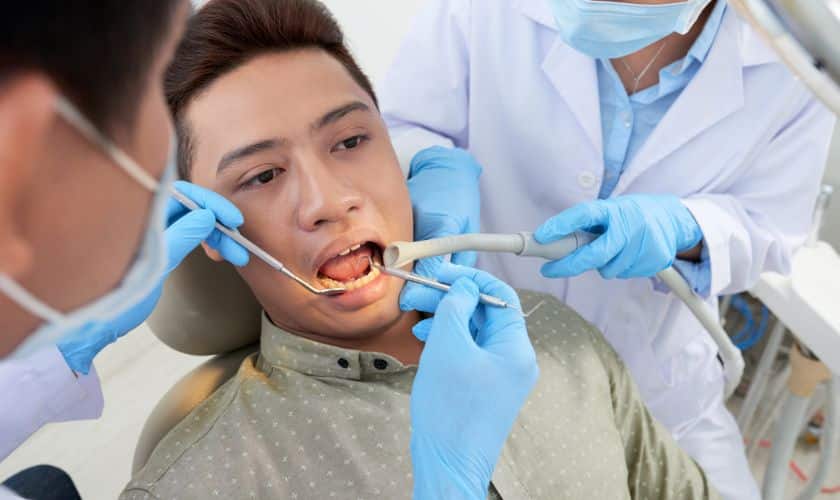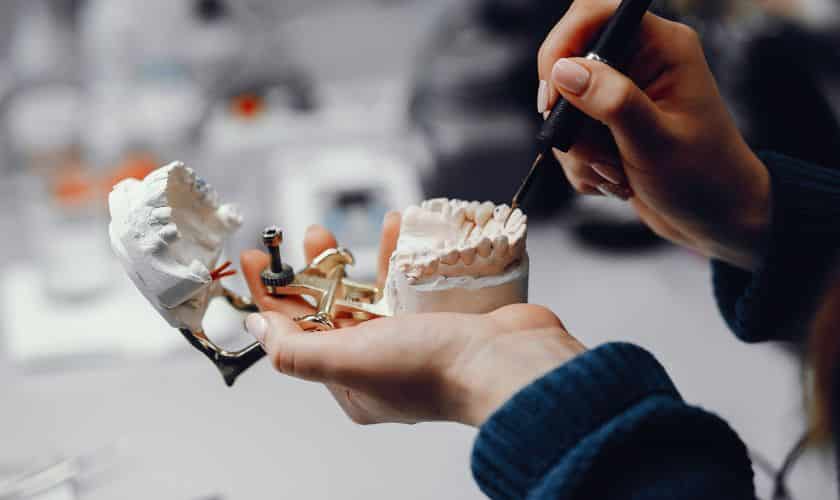Welcome to a new beginning, where smiles are transformed through full-mouth reconstruction. This comprehensive dental procedure aims to restore your smile’s functionality and aesthetics, offering a fresh start and renewed confidence. Whether you’ve experienced significant dental damage, wear, or tooth loss, full mouth reconstruction is a customized solution tailored to your unique needs. Through a combination of restorative and cosmetic treatments, such as dental implants, crowns, bridges, and veneers, your smile will undergo a remarkable transformation. Join us on this journey as we delve into the remarkable possibilities of full mouth reconstruction and the life-changing impact it can have on your oral health and overall well-being.
Understanding Full Mouth Reconstruction
Full mouth reconstruction is a comprehensive dental treatment that aims to restore the entire mouth’s health, function, and aesthetics. It involves a combination of restorative and cosmetic procedures to address various dental issues, such as missing teeth, damaged teeth, bite problems, and gum disease. The process begins with a thorough assessment to evaluate the teeth, gums, and jaw condition. A customized treatment plan is then created to address individual needs. Full mouth reconstruction can include dental implants, crowns, bridges, dentures, orthodontic treatments, and cosmetic procedures like veneers and teeth whitening. Full mouth reconstruction can transform smiles and improve oral health by addressing multiple dental concerns.

Procedures Involved In Full Mouth Reconstruction
1. Comprehensive examination: The first step is thoroughly examining the mouth, including teeth, gums, and jaw alignment, to assess oral health.
2. Restorative treatments: Procedures such as dental fillings, crowns, and dental bridges may repair damaged or decayed teeth and restore their functionality.
3. Dental implants: Missing teeth can be replaced with dental implants, which are surgically placed into the jawbone to provide a stable foundation for crowns, bridges, or dentures.
4. Periodontal therapy: Gum disease can be treated through scaling and root planing, which remove plaque and tartar buildup and promote gum health.
5. Orthodontic treatments: If bite alignment issues are present, orthodontic treatments like braces or clear aligners may be used to correct the position of the teeth and improve overall bite function.
6. Cosmetic procedures: Full mouth reconstruction may include cosmetic treatments like dental veneers, teeth whitening, or gum reshaping to enhance the smile’s appearance.
7. Temporomandibular joint (TMJ) treatment: If TMJ disorder is present, treatment options such as splints or physical therapy may be recommended to alleviate jaw pain and improve jaw function.
8. Collaboration with specialists: In some cases, collaboration with specialists such as oral surgeons or periodontists may be necessary to achieve optimal results.
It’s important to note that the specific procedures involved in full mouth reconstruction will vary based on individual needs and treatment goals. A comprehensive evaluation and consultation with a qualified dentist will help determine the most suitable treatment plan.
Source: Dental Minute with Steven T. Cutbirth, DDS
Who Is An Eligible Candidate For Full Mouth Reconstruction?
If you experience or spot any one of the following, visit your dentist for Full Mouth Reconstruction:
1. Severe tooth decay: Individuals with extensive tooth decay that cannot be effectively treated with simple restorative procedures may be candidates for full mouth reconstruction.
2. Missing teeth: Those who have lost multiple teeth or have significant tooth loss may benefit from full mouth reconstruction to restore the function and aesthetics of their smile.
3. Dental trauma: Patients who have experienced dental trauma resulting in multiple damaged or fractured teeth may require full mouth reconstruction to restore the appearance and functionality of their teeth.
4. Bite misalignment: Individuals with severe bite misalignment, such as overbite, underbite, or crossbite, that affects their oral function and overall oral health may be candidates for full mouth reconstruction.
5. Worn-down teeth: Patients with excessively worn-down teeth due to bruxism (teeth grinding) or other factors may require full mouth reconstruction to rebuild and restore their teeth’ natural height and function.
6. TMJ disorders: Individuals with temporomandibular joint (TMJ) disorders, characterized by jaw pain, clicking or popping sounds, and difficulty in jaw movement, may benefit from full mouth reconstruction to address the underlying issues and improve jaw function.
7. Gum disease: Advanced stages of gum disease, where the gums and supporting structures are significantly affected, may require full mouth reconstruction to restore oral health and prevent further deterioration.
It’s essential for individuals considering full mouth reconstruction to consult with a qualified dentist or prosthodontist who can assess their specific dental condition and determine the appropriate treatment plan.
Aftercare Tips:
1. Follow oral hygiene practices: Maintain good oral hygiene by brushing your teeth at least twice daily and flossing daily. Use a soft-bristle toothbrush and a non-abrasive toothpaste to protect any restorations or implants.
2. Attend regular dental check-ups: Schedule regular follow-up appointments with your dentist to monitor the progress of your full mouth reconstruction and ensure that everything is healing properly. It will also allow your dentist to address concerns or adjust as needed.
3. Avoid hard or sticky foods: To protect your dental restorations, avoid biting or chewing on hard objects like ice or candies. Also, avoid sticky or chewy foods that can dislodge or damage your restorations.
4. Wear a nightguard: If you have a history of teeth grinding or clenching, wearing a nightguard can help protect your dental restorations and prevent damage. Talk to your dentist about getting a custom-fitted night guard for optimal protection.
5. Maintain a balanced diet: Eating a balanced diet rich in vitamins and minerals can support the healing process and contribute to the long-term success of your full mouth reconstruction. Avoid excessive consumption of sugary foods and drinks, which can increase the risk of dental issues.
6. Address any discomfort or concerns promptly: If you experience any pain or discomfort, or notice any issues with your dental restorations, contact your dentist immediately. Promptly addressing any concerns can help prevent further complications and ensure the success of your full mouth reconstruction.
Remember to follow your dentist’s specific aftercare instructions and communicate any questions or concerns. By taking proper care of your oral health and following these aftercare tips, you can maintain the results of your full mouth reconstruction for years to come.
FAQs:
1. What is full mouth reconstruction?
Full mouth reconstruction is a comprehensive dental treatment that involves restoring or replacing multiple teeth in both the upper and lower jaws to improve oral health, functionality, and aesthetics.
2. Who is a candidate for full mouth reconstruction?
Candidates for full mouth reconstruction are individuals with multiple dental issues, such as missing teeth, damaged teeth, gum disease, bite problems, or jawbone loss. A consultation with a dentist is necessary to determine eligibility.
3. How long does full mouth reconstruction take?
The duration of full mouth reconstruction varies depending on the complexity of each case. It can take several months to a year or more to complete, involving multiple procedures tailored to the individual’s needs.
4. What procedures are involved in full mouth reconstruction?
Full mouth reconstruction treatment options include dental implants, dental crowns, bridges, veneers, orthodontics, gum treatments, and more. The specific procedures recommended will depend on the individual’s dental condition.
In conclusion, Full mouth reconstruction offers a transformative opportunity to rebuild and revitalize smiles. With a combination of advanced dental procedures, this comprehensive treatment can address many dental issues, restoring oral health, function, and aesthetics. Experience a new beginning with a confident smile and improved quality of life through full mouth reconstruction.




